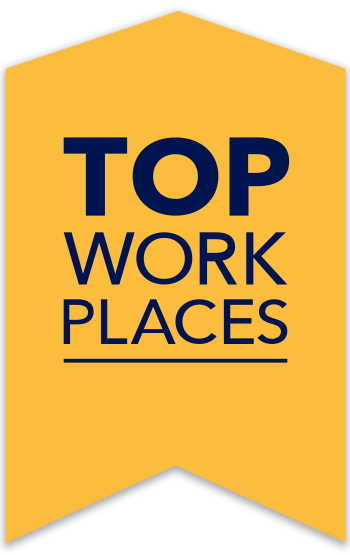According to the U.S. Census Bureau, women make up 50.9 percent of the population. Yet the number of female business leaders, specifically CEOs of Fortune 500 companies, amounts to 41. That’s roughly 8 percent. With growing awareness of gender diversity, the number of women in leadership is on the rise. This is especially true in Top Workplaces where the top women in business are making an impact.
Let’s take a closer look at some of today’s most influential female business leaders. We honor their most notable accomplishments and also recognize the majority of the organizations as Top Workplaces award winners.
1. Tricia Griffith, CEO, Progressive Insurance
Working her way up from a claim representative in the 1980’s to CEO in 2016 has been quite the journey for Tricia Griffith, who has been called one of the most powerful women in business by Fortune magazine. Recognizing that company values and culture can only flourish with the right employees, she has focused on people rather than profit, hiring more than 15,000 people since taking over her CEO role.
Knowing when to lead and when to get out of the way has taken this top female leader far. Griffith recognizes the importance of listening to every employee that plays a role in the company. Her focus on customers who have both home and auto insurance is a critical component of the company’s continued success.
The long-time Top Workplaces winner, including multiple regional and national, awards, Progressive Insurance is recognized for its people-first culture. See Progressive Insurance’s Top Workplaces Company Profile.
2. Julie Sweet, CEO, Accenture
In 2019, The New York Times proclaimed Julie Sweet “one of the most powerful women in corporate America.” It comes as no surprise given Sweet’s impressive background, including landing a job at Cravath, Swaine & Moore, where she was a partner for 10 years in a predominately male firm. She became general counsel of Accenture in 2010 before taking on the role of CEO in 2015.
In addition to leading a tech solution company ranked among the “World’s Most Admired Companies,” Sweet is also passionate about fostering women business leaders, especially at Accenture. Her goal to have 50/50 gender equality across the company by 2025 is something she is passionate about. Encouraging women business leaders, she is also working to ensure at least 25 percent of the managing director roles are held by women.
Accenture has been recognized as a Top Workplace in multiple regions, including Houston, Chicago, Dallas, Philadelphia, and Minneapolis, just to name a few. See the Accenture Top Workplaces Profile.
3. Abigail Johnson, CEO, Fidelity Investments
After receiving a bachelor of arts degree in art history from Hobart and Willian Smith College in 1984 and an MBA from Harvard Business School in 1988, Abigail Johnson joined Fidelity Investments full time. She took on several different roles in the company until 2014, when she became CEO, taking over a position previously held by her father and before him, her grandfather, who founded the company in 1946.
Among the top women in business, Johnson’s leadership has allowed the investment company to maintain its top ranking as the nation’s leading IRA and 401(k) investment provider. Ensuring the company continues to remain relevant and true to the times, she embraced cryptocurrencies early on and launched an investment platform that supports bitcoin and ether trading.
A multi-year, multi-regional award winner, you can see the Fidelity Investments Top Workplaces Profile here.
4. Jayshree Ullal, President and CEO, Arista Networks
Years ago, Jayshree Ullal was a senior vice president at Cisco. Deciding to trade that position for a spot at Arista, a little-known cloud networking company at the time, might have seemed like a fatal move. But Ullal grew Arista from a 2.75-billion-dollar business in 2014 to the 23-billion-dollar company it is today.
Born in London and raised in India, Ullal holds a BS in Engineering (Electrical) and an MS degree in engineering management. She is the recipient of numerous awards, including Barron’s “World’s Best CEOs” in 2018 and Fortune’s “Top 20 Business Persons” in 2019.
A Bay Area News Group winner, you can see the Arista Network Top Workplaces Profile here.
5. Cynthia Marshall, CEO, Dallas Mavericks
Cynthia Marshall, the NBA’s first black female CEO, is no stranger to adversity. Having escaped the Jim Crow South with her family before her first birthday, the West Coast came with its own challenges, yet Marshall persevered. She earned a full scholarship to Berkeley in the 1970s, where she studied administration and human resources management. Marshall became the first African American cheerleader and the first Black woman to join Delta Gamma.
She went on to work for AT&T, but after 36 years with the company, she decided to launch her own consulting firm in 2017, specializing in leadership and diversity. It wasn’t long after that she got a call from Mark Cuban, owner of the Dallas Mavericks. He was looking to change the organization’s image steeped in a sexual harassment and misconduct scandal. Once again, Marshall rose to the occasion and set out to make some remarkable changes.
When Marshall began her CEO role in 2018, there were no women or people of color on the leadership team. Today things are very different – women make up 50 percent of leadership in the organization, with people of color comprising 47 percent. Inspiring female business leaders to remain true to who they are, Marshall continues to push cultural and racial boundaries, championing the “speak-up culture” and ensuring every person at the organization is recognized and heard.
6. Mary Barra, Chairman and CEO, General Motors
Acting as the first woman CEO of a major automaker, Mary Barra’s career began with GM in 1980 as a General Motors Institute co-op student. After completing her BS in electrical engineering in 1985, she went on to get her MBA from Stanford Graduate School of Business in 1990.
Known for taking action, Barra has shifted GM’s focus to electric vehicles, forming what is considered by some to be a risky partnership with Tesla rival Nikola. She has also overseen the construction of thousands of new charging stations. More recently, she has called for actionable change in the workplace in the wake of the Black Lives Matter movement by creating an Inclusion Advisory Board, promoting employee inclusion, and financially supporting other organizations that promote racial justice and inclusion.
In addition to her role at GM, Barra also serves on the Board of Directors of the Walt Disney Company, the Duke University Board of Trustees. She is also a Board Member of the Business Roundtable, where she chairs the Education and Workforce Committee.
A regional winner in Austin, Atlanta, and Detroit, see the General Motors Top Workplaces Profile here.
7. Jane Fraser, CEO, Citi
Making a name for herself hasn’t necessarily been a straight shot for Jane Fraser. She strategized her way through the recession crisis of 2008 and has had to tackle the challenges of managing a multi-billion-dollar financial institution amid a global pandemic.
Making history among top women in business in February 2021, Fraser became the first woman to head a major U.S. Bank and the first female to serve as CEO at Citi. Her experience with the global company spans almost two decades in a diverse range of roles, including Chief Executive Officer of Citigroup Latin America, Global Head of Strategy and Mergers & Acquisitions. And as CEO of Global Consumer Bank, she was responsible for Citi’s consumer businesses that span 19 different markets.
Before joining Citi, Fraser received her MA in economics from Cambridge University and worked abroad in London and Madrid.
8. Amy Hood, EVP and CFO, Microsoft
Microsoft has undergone a profitable digital transformation thanks to Amy Hood, who joined the company in 2002. Under her care, the technology giant has gained momentum in cloud computing, transitioned to a subscription-based business model, and strategically executed LinkedIn and GitHub’s acquisition.
Hood has been a long-time supporter of Microsoft’s climate and affordable housing initiatives, which has evolved the company’s reputation for making a positive impact on broader global concerns. Closer to home, Hood and her husband recently bought a stake in the Seattle Sounders, a pro soccer team dedicated to community outreach.
A multi-year, multi-region winner, see the Microsoft Top Workplaces Profile here.
9. Kathrin Jansen, Senior Vice President/Head of Vaccine Research and Development, Pfizer
As a child growing up in 1960s East Germany, Kathrin Jansen developed a fascination with medicine. Her family made the difficult decision to flee to West Germany before the construction of the Berlin Wall. Jansen was given a chance to pursue her passion, attaining her PH.D. at Philipps-University in Marburg then working for the Glaxo Institute for Molecular Biology in Geneva, where she focused on drug development.
Jansen has built a reputation of being a nonconformist in her work with challenging diseases. Her groundbreaking research in the U.S. led to the world’s first cervical cancer vaccine and later the development of Prevnar 13®. The vaccine works to prevent meningitis in children and pneumonia in older adults, and it’s one of Pfizer’s best-selling products to date.
Joining Wyeth Pharmaceuticals, now part of Pfizer, in 2006, Jansen oversaw the vaccine research and clinical testing operations as Senior Vice President. After 28 years of pharmaceutical experience, her work with Pfizer during the COVID pandemic led to another breakthrough. The company has been among the first to provide a market-ready vaccine, thanks in no small part to Jansen’s leadership.
10. Penny Pennington, Managing Partner, Edward Jones
Under her strategic guidance as managing partner, Penny Pennington has boosted brokerage firm Edward Jones’ revenue by 11 percent.
Effectively working with 49,000 associates across North America is no small feat, nor has it been easy to overcome concerning diversity and gender equality numbers in the company – people of color make up 8 percent of the firm’s financial advisors, with only 21 percent of advisors being women.
Yet this Nashville native has embraced these challenges head-on, inspiring women business leaders to contribute to the advancement of a more diverse workplace. Placing focus on what’s most important to clients, colleagues, and communities across North America continues to be at the heart of Pennington’s vision for Edward Jones as the company works to build continued value and long-term relationships.
See the Edwards Jones Top Workplaces Profile here, featuring both regional and national awards.
Celebrating Women in Leadership
While women business leaders may approach their roles with contrasting management styles and goals, their leadership shares one commonality. They inspire women everywhere to see the potential for change in the workplace, encouraging them to pursue leadership roles that once felt out of reach.
As more and more top female business leaders bridge the gap of workplace gender inequality, we must also recognize women who are making strides to bring about real change. Woman-Led Top Workplaces are a testament to the women making a difference in Top Workplaces nationwide by breaking down gender barriers, leading with a people-first culture, and inspiring female business professionals to do more.
Energage recently announced the recipients of the first-ever Woman-Led Top Workplaces award. Which companies earned top-three bragging rights? See the reveal here:
Based entirely on authentic employee feedback, Top Workplaces offers credible, year-round employer recognition, including regional, national, Culture Excellence, and Industry awards. Take the first step and nominate your company today.

